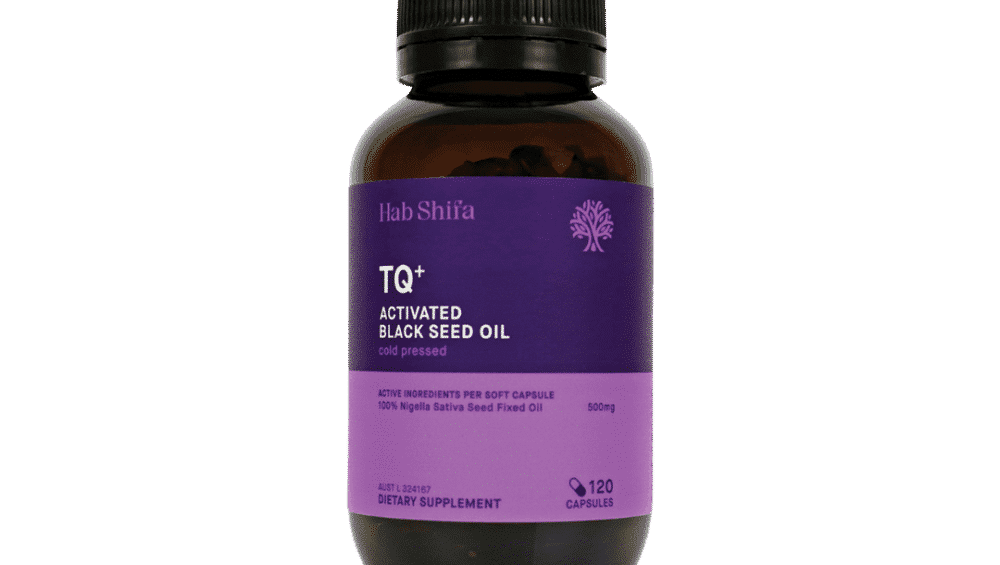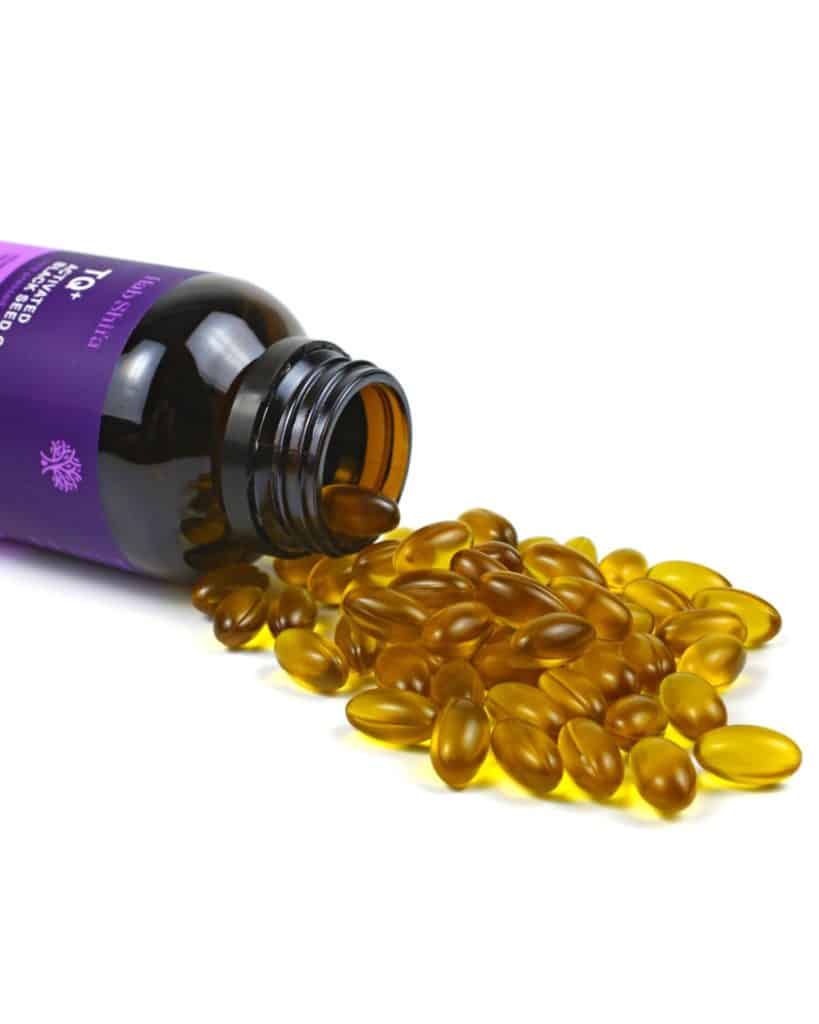What is black seed oil and the benefits of supplementing Black Seed Oil ?
Nigella sativa is a small flowering shrub with violet or white-tinged flowers native to Eastern Europe, the Middle East, and western Asia.
While the shrub may appear unassuming, it produces fruits with tiny black seeds. For thousands of years, these black seeds have been used in herbal remedies.
Archaeologists discovered black seeds in King Tut’s tomb, highlighting their historical significance as a source of healing and protection. Additionally, they are used in cooking to enhance the flavour of breads, curries, and pickles. When consumed, the seeds have a bitter flavour reminiscent of cumin or oregano.
The Benefits of Supplementing Black Seed Oil also include antioxidant properties have been demonstrated for black seed oil. These can aid in the relief of inflammation both internally and externally.
The Benefits of Supplementing Black Seed Oil
Black seed oil has shown promise in the treatment of several common health problems, including hypertension and asthma. Additionally, it exhibits potent antifungal activity against Candida albicans, a yeast that can grow out of control in the body and cause candidiasis.
Additional The Benefits of Supplementing Black Seed Oil include the following:
The Benefits of Supplementing Black Seed Oil for two months has been shown to significantly lower blood pressure in people with mildly elevated blood pressure.
The Benefits of Supplementing Black Seed Oil has been shown to help lower cholesterol levels. It contains a high concentration of healthy fatty acids, which can help you maintain a healthy cholesterol level. Linoleic and oleic acids are examples of these fatty acids.
The oil content varies according to the region where the black seeds are grown. Individuals may also experience benefits from consuming the crushed seeds.
The Benefits of Supplementing Black Seed Oil for rheumatoid arthritis may be improved.
The Benefits of Supplementing Black Seed Oil Reduced asthma symptoms, Black seed oil’s anti-inflammatory properties may extend to reducing asthma symptoms. Its anti-inflammatory effect on the airways may also help alleviate bronchitis symptoms.
The Benefits of Supplementing Black Seed Oil or taking black seed oil has been linked to a reduction in stomach pain and cramps. Additionally, the oil may help reduce gas, stomach bloating, and the incidence of ulcers.
Additionally, The Benefits of Supplementing Black Seed Oil is believed to have anticancer properties. When applied topically, it may aid in the fight against skin cancer.
Thymoquinone, a component of black seed oil, and other seed potions have been shown to inhibit tumour growth in laboratory rats.
Additionally, The Benefits of Supplementing Black Seed Oil may help to mitigate the tissue-damaging effects of radiation used to destroy cancer cells. However, these findings have not been replicated in humans.
Black seed oil should not be used in place of standard cancer treatment.
The Benefits of Supplementing Black Seed Oil for weight loss:
According to research conducted by a reputable source, black seed supplementation can assist individuals in lowering their body mass index (BMI). The study participants reported no severe adverse reactions to this supplement.
A meta-analysis according to a 2013 Trusted Source article published in the Journal of Diabetes & Metabolic Disorders, black seed oil may be beneficial in the fight against obesity.
The Benefits of Supplementing Black Seed Oil for healthy skin:
The following skin conditions may benefit from black seed oil:
Eczema: A small-scale 2013 study comparing the therapeutic benefits of Nigella sativa to those of prescription medications discovered that black seed oil can help alleviate the severity of hand eczema.
Acne: Research indicates that black seed oil’s antimicrobial and anti-inflammatory properties may help with acne. In one study, 58% of participants rated their response to this treatment as excellent, while 35% rated it as moderate.
Psoriasis: According to a 2012 study conducted on mice, the oil may also have antipsoriatic properties.
Additionally, black seed oil may hydrate hair, soften skin, and act as a moisturiser, although scientific evidence to support these claims is lacking.
Additionally, The Benefits of Supplementing Black Seed Oil for the following health conditions:
The Benefits of Supplementing Black Seed Oil for cancer
Recent research has demonstrated that the thymoquinone found in black seed oil has the ability to influence programmed cell death, or apoptosis, in several types of cancer cells. Brain cancer, leukaemia, and breast cancer cells are all examples of these.
However, because the majority of research on black seed oil’s effects on cancer is conducted on cells rather than live humans, researchers do not yet know how effective the oil may be in treating cancer patients.
The Benefits of Supplementing Black Seed Oil for liver and kidneys
According to a 2013 study on rats, black seed oil may help reduce the complications of liver and kidney disease and improve the structure of the organs. The researchers are unsure whether these effects would occur in humans as well.
The Benefits of Supplementing Black Seed Oil for diabetes
According to a study published in the Journal of Endocrinology and Metabolism, black seed oil may have anti-diabetic properties and may help control blood sugar levels. Again, this study used animal models, and additional research is needed to confirm the oil’s efficacy in humans.
The Benefits of Supplementing Black Seed Oil for Infertility
A randomised clinical trial with a placebo
According to a study, black seed oil can improve sperm movement and increase sperm count and semen volume in men with abnormal sperm and infertility.
The Benefits of Supplementing Black Seed Oil for treatment of Infections
Among the numerous superbugs that this potent oil is capable of eliminating, methicillin-resistant staphylococcus aureus (MRSA) is one of the most serious. MRSA is a global threat to hospitals and nursing homes, as common staph infections become resistant to generic antibiotics.
The elderly are particularly vulnerable, as it is frequently associated with invasive procedures such as surgery, intravenous tubing, and artificial joints. MRSA has become a global public health threat due to the growing population of senior citizens, primarily due to weakened immunity.
Fortunately, The Benefits of Black Seed Oil may be beneficial. Pakistani scientists discovered that each strain of MRSA was susceptible to N. sativa, demonstrating that black seed oil can help slow or prevent MRSA from spreading out of control.
Antifungal properties of compounds in black seed oil have also been investigated. To address the growing antifungal resistance problem associated with yeasts and moulds, a recent study was conducted to determine whether Nigella sativa seed oil could be beneficial.
The Egyptian Journal of Biochemistry and Molecular Biology published a study in which scientists tested thymol, TQ, and THQ against 30 human pathogens and discovered the following:
Each compound inhibited all 30 pathogens tested to 100%.
Thymoquinone was found to be the most effective antifungal agent against all dermatophytes and yeasts tested, followed by thymohydroquinone and thymol.
The most effective antifungal against moulds was thymol, followed by TQ and THQ.
What this study demonstrates is that Nigella sativa oil possesses a unique chemical constituent that is effective not only individually, but also collectively.
By demonstrating that fungus and moulds cannot exist in the presence of these phytochemicals, it’s easy to see why researchers are looking to black seed oil to solve the superbug problem.
Black seed oil maintains a healthy cholesterol level.
Did you know that black seed oil may even have cholesterol-lowering properties? That is true.
A 2017 study using an animal model discovered that an aqueous extract of Nigella sativa had anti-diabetic and cholesterol-lowering effects on animal subjects. After six weeks of administering low doses of black seed to diabetic animal subjects, total cholesterol, LDL (“bad”) cholesterol, and glucose levels decreased while HDL (“good”) cholesterol increased.
Another older randomised, double-blind, placebo-controlled trial was conducted on mildly hypertensive subjects. There was a placebo group, one that received 100 milligrammes of black seed twice daily, and one that received 200 milligrammes twice daily.
After eight weeks of supplementation, researchers discovered that those who took the black seed supplement experienced a dose-dependent decrease in systolic and diastolic blood pressure. Additionally, the supplementation with black seed extract resulted in a “significant decrease” in total cholesterol and LDL cholesterol.
In general, it appears as though black seed may aid in cholesterol reduction, as well as blood sugar and blood pressure control.
Is black seed oil safe? Risks and Adverse Reactions,
When taken orally or applied to the skin, black seed may cause an allergic rash. Before applying black cumin oil topically to your skin or hair, it’s a good idea to conduct a patch test to ensure there is no adverse reaction.
Always keep black seed oil away from your eyes and mucous membranes when using it.
When consumed internally, black seed oil may cause nausea, vomiting, or constipation. It may increase the risk of seizures in certain individuals.
Consult your doctor prior to using black seed oil if you are pregnant, nursing, taking any medication, or have a medical condition (especially diabetes, low blood pressure or a bleeding disorder).
If you are currently taking black seed oil and are scheduled for surgery, it is recommended that you discontinue use at least two weeks prior to your surgery date.
As with all oils, keep black seed oil away from sources of heat and light and out of reach of children.
Black seed oil Dosage.
There are numerous applications for black seed oil. To begin, black cumin oil can be applied topically, however, it should always be diluted with a few teaspoons of a carrier oil such as coconut or olive oil.
When diluted, it can aid in the treatment of common skin problems such as acne and eczema due to its antibacterial and anti-inflammatory properties. Additionally, some people find it beneficial for psoriasis and rosacea.
It can easily be added to homemade massage oils and lotions to reap the numerous health benefits of black cumin seeds. Simply add one drop to one tablespoon of a carrier oil for a warming massage.
A few drops of oil can be added to hair products such as shampoo and conditioner to promote hair and scalp health.
If you enjoy creating homemade fragrances with oils, you’ll be pleased to learn that this oil has a peppery aroma and works well as a base note.
With its spicy flavour, black seed oil of the highest quality 100 percent pure, therapeutic-grade, can be used in a wide variety of recipes, from meat main courses to soups and stews. Additionally, you can incorporate it into beverages such as chai tea lattes and smoothies.
Always choose a premium option that is 100 percent pure, therapeutic-grade.
Additionally, some companies specify that their black seed oil is cold-pressed, which means that it is extracted from Nigella sativa seeds without the use of external heat. Cold-pressed oils are sometimes said to be more flavorful.
If you’re not a fan of liquid supplements, black seed oil capsules are also available.
The recommended dose of black seed oil varies according to the individual and his or her health status.
There is no standard dosage at the moment, but the following oral dosages have been studied in scientific research to date:
- 2ml black seed oil twice daily for eight weeks. if you have diabetes.
- 2.5 mL black seed oil twice daily for two months to improve sperm function.
- 2ml black seed daily oil for 12 weeks to treat asthma.











